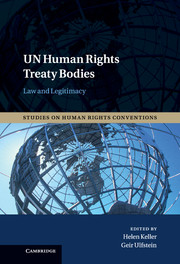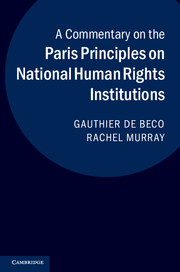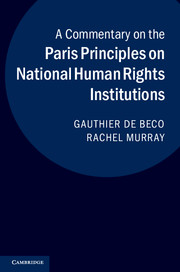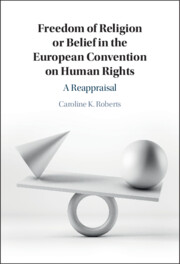The Future of UN Human Rights Treaty Monitoring
Every state in the world has undertaken human rights obligations on the basis of United Nations treaties. Today's challenge is to enhance the effectiveness of procedures and institutions established to promote the accountability of governments. This volume contains detailed analyses of the strengths and weaknesses of the system, written by leading participants in the work of the treaty bodies. Their recommendations provide a blueprint for far-reaching reform of a system of major importance for the future of international efforts to protect human rights.
- Thorough analysis of the UN human rights treaty system and its problems
- Essential reading for human rights advocates and scholars, as well as for those concerned with the development of international law
- Fully informed account building on the latest work by those actually engaged in the system as participants, secretariat members, NGO activists and scholars
Reviews & endorsements
"Well worth consulting." American Journal of International Law
"A thorough examination of the fragmented and troubled process by which the United Nations tries to supervise the application of its major human rights treaties." Choice
Product details
March 2011Adobe eBook Reader
9780511889783
0 pages
0kg
1 b/w illus. 4 tables
This ISBN is for an eBook version which is distributed on our behalf by a third party.
Table of Contents
- 1. The UN human rights treaty system: a system in crisis? James Crawford and Philip Alston
- Part I. The UN Human Rights Monitoring System in Action:
- 2. Individual chains in a world of massive violations: what role for the human rights committee? Henry Steiner
- 3. Decision-taking in the committee on the elimination of racial discrimination Michael Banton
- 4. The committee on the elimination of discrimination against women Mara R. Bustelo
- 5. The reporting process under the convention on the rights of the child Gerrison Lansdown
- 6. The committee on economic, social and cultural rights: catalyst for change in a system needing reform Scott Leckie
- 7. Country-orientated procedures under the convention against torture: towards a new dynamism Roland Bank
- 8. UN human rights reporting procedures: an NGO perspective Andrew Clapham
- Part II. National Influences and Responses:
- 9. Making human rights treaty obligations a reality: working with new actors and partners Anne Gallagher
- 10. Domestic implementation of international human rights treaties: Nordic and Baltic experiences Martin Scheinin
- 11. The domestic impact of international human rights: the Japanese experience Yuji Iwasawa
- 12. The role of human rights treaties in domestic law: the southern African experience John Dugard
- 13. Uses and abuses of the treaty reporting procedure: Hong Kong between two systems Andrew Byrnes
- 14. The United States and the international human rights treaty system: for export only? Stefanie Grant
- Part III. Regional and Sectoral Comparisons:
- 15. Reporting in the inter-American system of human rights protection Antônio Cançado Trindade
- 16. The reporting system of the European social charter David Harris
- 17. The role of reporting in international environmental treaties: lessons for human rights supervision Daniel Bodansky
- Part IV. Common Challenges for the Treaty Bodies:
- 18. The problem of overlapping among different treaty bodies Eric Tistounet
- 19. Bodies of knowledge: a diversity promotion role for the UN High Commissioner for human rights? Craig Scott
- 20. Treaty bodies in states of emergency: the case of Bosnia and Herzegovina Michael O'Flaherty
- 21. Ensuring effective supervisory procedures: the need for resources Elizabeth Evatt
- 22. Servicing and financing human rights supervision Markus Schmidt
- Part V. Looking into the Future:
- 23. Beyond 'them' and 'us': putting treaty body reform into perspective Philip Alston.







